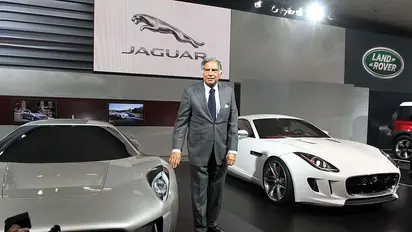Remembering Ratan Tata: Humiliated by Ford, how industry titan got revenge by buying Jaguar and Land Rover

Synopsis
In one of the most dramatic turnaround stories in the global auto industry, two of the world’s most prestigious automotive brands, Jaguar and Land Rover, entered the Tata stable following an experience that Ratan Tata could neither forget nor forgive.
In one of the most dramatic turnaround stories in the global auto industry, two of the world’s most prestigious automotive brands, Jaguar and Land Rover, entered the Tata stable following an experience that Ratan Tata could neither forget nor forgive. The story, which began with a condescending insult from Ford Motors, ultimately led to Tata Motors acquiring these iconic brands and transforming their fortunes.
In 1998, Ratan Tata launched what was then a groundbreaking project for the Indian automotive industry – the Tata Indica, India’s first hatchback with a diesel engine. This was Tata’s vision of putting India on the global automotive map. However, the Indica’s initial sales were sluggish, and within a year of its debut, Tata Motors faced mounting losses. Faced with these difficulties, the company began exploring options to sell its fledgling passenger car business.
Ford Motors, a global automotive giant at the time, was seen as the ideal candidate to buy Tata’s struggling car division. Talks between the two companies started in 1999, with Ford officials visiting Tata's headquarters, Bombay House, in Mumbai. The American firm expressed interest in acquiring the business, leading to a high-level meeting in Detroit, where the fate of Tata Motors’ car division would be decided.
A humiliating encounter with Ford
Ratan Tata and his core team, filled with hopes of sealing a deal, flew to Detroit to meet with Bill Ford, then chairman of Ford Motors. However, the meeting, which lasted around three hours, did not go as expected. According to those present, the discussions quickly turned sour.
Ford executives, in a condescending tone, questioned Tata’s decision to enter the passenger car market. "You do not know anything, why did you start the passenger car division at all?" one of the Ford officials reportedly said. The American team further implied that buying Tata’s car division would be a favor to the Indian conglomerate, which deeply offended Ratan Tata and his team.
The atmosphere during the meeting was described as “humiliating” by one attendee. The negotiations collapsed, and Tata's team made immediate plans to return to India. On the flight back to New York, Ratan Tata, usually known for his calm demeanor, remained unusually quiet, visibly affected by the encounter. However, the humiliation sparked a renewed determination in him. Ratan Tata decided not to sell the unit and instead focused on turning the struggling business into a success.
Turning failure into success
What followed in the years after that meeting was a classic tale of resilience and determination. Tata Motors continued to work on improving its passenger car business and expanded its footprint in the global automotive market. The company’s perseverance paid off when, nine years later, the tables had turned.
In 2008, the global financial crisis wreaked havoc across industries, and Ford, once a titan of the auto world, found itself on the verge of bankruptcy. As the company scrambled to restructure its finances, it put up two of its most prized assets, Jaguar and Land Rover, for sale.
This time, it was Tata’s turn to buy.
The iconic deal: Tata Motors acquires JLR
In June 2008, Tata Motors finalized a $2.3 billion all-cash deal to acquire Jaguar and Land Rover (JLR) from Ford. What made this moment particularly significant was the way in which the dynamics between the two companies had shifted. As the deal was finalized, Ford chairman Bill Ford thanked Ratan Tata and his team, saying, "You are doing us a big favor by buying JLR."
This statement was a stark contrast to the derogatory comments made nine years earlier, demonstrating how dramatically the situation had reversed. Pravin Kadle, who was part of the Tata team in both 1999 and 2008, recalled this poignant moment during a public event in 2015, underlining the magnitude of the transformation.
Under Tata’s ownership, Jaguar and Land Rover experienced one of the most successful turnarounds in automotive history. Tata Motors’ strategy of giving the two British brands operational freedom and investing in technology and design innovation paid off. Both Jaguar and Land Rover grew into formidable players in the global luxury car market, renowned for their engineering excellence, iconic designs, and cutting-edge technologies.
Tata Motors itself benefitted tremendously from the acquisition. Although the company has made significant strides in the Indian market, JLR continues to be a major source of revenue, contributing significantly to the group’s international business. The acquisition has solidified Tata Motors’ reputation as a global automotive player.
JLR: The backbone of Tata Motors
Today, Jaguar and Land Rover are the backbone of Tata Motors’ global operations. The iconic brands, once struggling under Ford’s ownership, are now thriving, with a strong presence in luxury car markets worldwide. Tata’s visionary leadership and the company’s resilience have turned what could have been a story of failure into one of the greatest success stories in the auto industry.
In hindsight, the humiliating encounter in Detroit back in 1999 was not an obstacle but a catalyst. It spurred Ratan Tata to build an empire that not only saved two prestigious brands but also redefined Tata Motors’ place in the global automotive landscape.
Get all the latest Automobile News, including updates on Electric Vehicles, new car and bike launches, reviews, and auto industry trends. Stay informed about mileage comparisons, performance insights, and expert opinions to guide your next vehicle choice. Download the Asianet News Official App for all the latest updates from the world of automobiles.